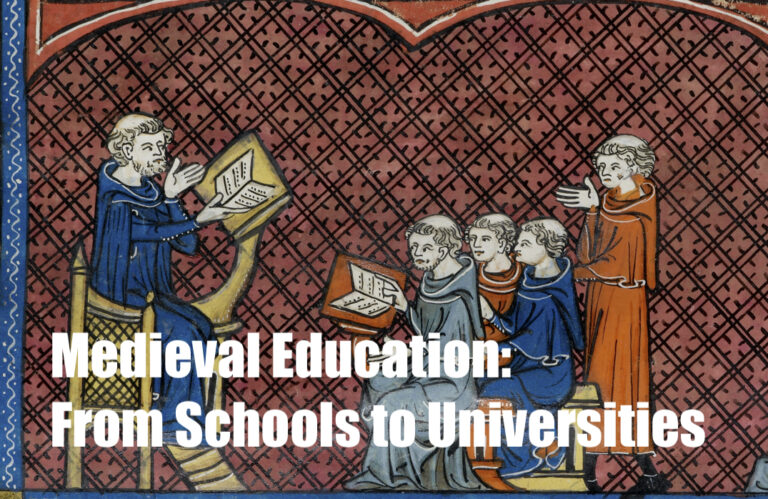Explore the history of medieval education through the development of schools, curricula, the growth of universities, and the diverse people involved in teaching and learning over the past 1000 years. Classes begin on Tuesday, October 29th.
This 6-week course includes a 90-minute live session with an instructor every week from 2:00pm to 3:30pm ET. The session will consist of a lecture, discussion of the reading, and a question and answer session. If you are unable to attend the live session, you can watch the recorded version later. Click here to sign up.
Week 1: What makes education medieval?
In the first week, we explore how medieval education has been characterized and how education continues to create and define the meaning of ‘medieval’. We will explore the foundations of the late Roman educational system inherited in medieval Europe and the Christian learning system.
Week 2: Teaching and Learning in the Carolingian World
Learn about the origins of the so-called Carolingian Renaissance, how it shaped the rest of educational history, and what ancient texts were preserved (or not) for modern readers. It also covers scholars who traveled throughout Europe, particularly Alcuin, the famous British teacher and court intellectual.
Week 3: The High Middle Ages: 11th Century Manners and 12th Century Discussion
This week we move to the High Middle Ages, when the growth of population and cities gave rise to more complex and numerous city schools. We explore the rise of scholastic thought and the prevalence of scholars spending so much time arguing with each other, and the problems associated with it.
Week 4: Language and Learning: Local Educational Traditions
In week 4, we move away from the central story and look at the different traditions across Europe and the diversity that arose as new educational systems developed during the Middle Ages. The focus will be on regions with unique textbooks written in local languages, particularly Iceland, Ireland, and Northern Italy.
Week 5: Medieval University
Discover the surprisingly different medieval universities that evolved into modern universities. We look at how universities spread across Europe, how they redefined formal education, and their many entanglements with issues such as papacy and city life.
Week 6: Humanists, Lutherans, Print: The End of Medieval Education
In the final week, we look at how we can think about the end of a distinctly ‘medieval’ education for religious, technological and academic reasons. At the same time, we also discuss the many continuities between medieval and modern education that show how medieval traditions, ideas, and practices remain with us.
The lecturer is Dr. Ryder Patsk Russell, a historian specializing in medieval Iceland, Old Norse language and literature, and the medieval church. I have been interested in the history of education ever since I first discovered how strange and eclectic medieval Icelandic grammar textbooks were. His first book, The Development of Education in Medieval Iceland, was published in 2021. He is currently a postdoctoral researcher at the University of Silesia in Katowice, Poland, researching the late Middle Ages in Iceland with a focus on monasteries, churches, and social networks. .


